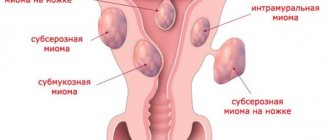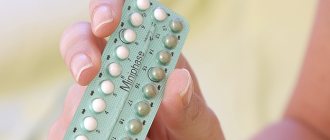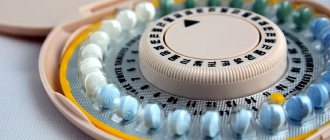Uterine fibroids are a benign nodule-like tumor. The presence of such fibromatous formations in women of reproductive age is not uncommon, and therefore the issue of selecting suitable contraceptives for such pathology does not lose its relevance. In most cases, the optimal solution is the use of hormonal drugs.
What are the benefits of OCs in the treatment of fibroids?
Contraceptives are characterized by the presence of artificially synthesized hormones. They act in almost the same way as those produced by the female body.
Uterine fibroids are one of the hormonally caused diseases. Regular use of such contraceptives contributes to:
- slowing down the growth and development of fibromatous nodes (sometimes reducing their size);
- cure some concomitant pathologies;
- increasing libido levels;
- prevention of the emergence of new formations;
- prevention of unwanted pregnancy (women with fibroids are more likely to develop pregnancy pathology);
- weakening of menstrual bleeding and accompanying symptoms;
- the imminent onset of menopause (if the drug is used during menopause).
Without adequate treatment, fibroids cause severe and frequent uterine bleeding, which soon leads to the development of anemia. In addition, the risk of a woman having polyps or endometrial hyperplasia increases. Therefore, the use of hormonal contraceptives is very appropriate.
Effect of contraceptives
Before the age of 40, birth control pills for uterine fibroids produce their main effect - protection against unwanted pregnancy. In addition, if they are chosen correctly, taking them can normalize hormonal balance and stop the growth of fibroids. They also significantly influence the severity of symptoms.
Normalize the menstrual cycle, reduce the intensity of menstruation and bleeding. Sometimes even the pain syndrome becomes less pronounced. It is for this reason that some types of birth control are used as therapy to treat tumors in the uterus.
In women over 40 years of age, another positive effect is possible. In addition to preventing unwanted pregnancy and having a positive effect on fibroids, the tablets have the following effects:
- Reducing the risk of cancer;
- Increasing bone density by normalizing hormonal balance;
- Reduced mood swings for the same reason;
- Improvement in general condition – absence of fever, sweating;
- Increased sexual desire;
- Elimination of insomnia;
- Reduced anxiety and improved mood.
It is important to remember that you need to select the drug very carefully. It is better if a doctor does this. After the age of 40, drugs that increase estrogen production are not advisable. After all, they can negatively affect fibroids and accelerate their growth.
Which OCs are best to take for fibroids?
According to gynecologists, the following types of oral contraceptives are the most effective for this disease:
- combination type products made on the basis of progesterone and estrogen;
- single-phase tablets;
- non-combined drugs.
For fibromatous nodes, the selection of suitable medications is carried out only by the attending physician based on the examination results. He also determines the regimen for taking the drug.
For small formations
For the treatment of small intrauterine nodes or to prevent their occurrence, hormonal contraceptives of any type . Therefore, the selection of the drug is carried out based on the individual characteristics of the hormonal status and constitution of the patient.
Usually the choice is to use mini-pills ("minimal pills" of gentle action), since they contain only microdoses of progestin and they are characterized by the least number of contraindications.
At large
If a myomatous node detected in a woman is large in size, then it is necessary to take into account that voluminous neoplasms displace and deform the uterus, and it will not be possible to completely eliminate them with the help of contraceptives.
Doctors' opinion
Almost all experts agree that hormonal contraceptives can help with uterine fibroids. However, they will not be able to be completely cured.
Alexandra Ivanovna, gynecologist:
Many women come to me asking what contraceptives they should use if they have uterine fibroids. The selection should take place individually with each woman, since each has her own reactions and her own medical history. Hormonal contraception can even slightly reduce the volume of tumors if used correctly. But the entire disease cannot be cured using OCs alone. Moreover, a noticeable result will be only with small fibroids.
Rules of application
As noted earlier, the dosage and regimen of hormonal contraceptives is determined by the attending physician. Typically, oral medications are taken for three weeks at the same time, after which a seven-day break is required.
The principle of using vaginal rings and patches is similar (replaced every seven days). Injections of long-acting drugs are given every three weeks, and an intrauterine device is installed once every five years.
Contraception for fibroids: after 40.45 years, reviews from doctors, and endometriosis
We don't notice our health while we have it. If something goes wrong, then most often we fall into panic, rush around, look for a way out, and run to the doctors.
We don't notice our health while we have it. If something goes wrong, then most often we fall into panic, rush around, look for a way out, and run to the doctors.
And we never think about our own internal resources that can heal our illnesses. Just as we don’t think that we created this health problem for ourselves.
Treatment of uterine fibroids without surgery and hormonal therapy is a woman’s dream. No one wants to go under the surgeon’s knife or poison themselves with hormones.
Medicine, unfortunately, does not offer an alternative. But it exists, you just need to start treatment from a completely different direction.
Our body is a wonderful self-adjusting system.
If our behavior, thinking and lifestyle destroy it more than it is able to heal itself, then diseases appear.
But even in this case diseases are not our enemies , they are simply an opportunity for our body to restore lost balance, “let off steam,” and prevent even greater destruction.
This fully applies to all women's diseases. Colpitis, cervicitis, inflammation of the uterus and appendages, polyps, fibroids, endometriosis and all the other “joys of life” are just a compensatory reaction of our body. And this reaction is aimed, oddly enough, at restoring the lost balance.
Subscribe to our INSTAGRAM account!
Every illness brings us a message.
The task is to hear this news, draw conclusions, and change.
But such an attitude towards diseases does not exist in official medicine.
I have already said many times that the thinking of doctors is symptomatic. It is the symptom that is considered a disease; it is the symptom that pills and scalpels are directed against.
Here's a simple example. The woman eats a lot of sweets. Well, people love pastries and pies. And suddenly - thrush. Panic and horror, what to do? Rather, you need to take pills, insert candles - the fight has begun.
But the pills are of no use, the torment continues. At the same time, the woman does not know and does not think that Candida fungi, which are considered the cause of thrush, eat excess carbohydrates, this is their food. Too many carbohydrates - thrush blooms.
They simply have to reproduce in order to remove excess sweets from the body!
Agree, you won’t be able to cure thrush with drugs, even if you treat it for years. You need to stop eating sweets and the thrush will go away on its own.
The same applies to any other health problem. Of course, this also applies to uterine fibroids.
Therefore, if you have fibroids, the first thing you need to do is change your approach to treatment. We need to stop considering it a disease. This is only a symptom, with its help the body is trying to tell us something.
Action of COCs: regulon, silhouette, janine for uterine fibroids, reviews
In order to understand how hormonal contraceptives work, you need to understand what they are and their mechanism of action.
Hormones are biologically active substances that are produced by our endocrine glands: the thyroid gland, adrenal glands, etc. Their spectrum of action is varied.
They participate in basic metabolism, growth of the body, are responsible for behavior and support the function of other organs. But we are only interested in the hormones of the sex glands: estrogens and gestagens (progesterone).
It is these two groups of hormones that take an active part in regulating the monthly cycle.
The principle of action of all hormonal contraceptives is basically the same:
- Suppress ovulation;
- Prevents the egg from implanting in the endometrium of the uterus.
Daily use of COCs (Janine, Regulon, Silhouette) puts a woman's ovaries into a so-called “artificially induced” drug-induced sleep, as a result of which the gonads do not ovulate each new cycle.
The use of drugs such as Janine for uterine fibroids, or Regulon for uterine fibroids, helps reduce the intensity of bleeding during the cycle and shortens the duration of menstruation to one or two days.
The pain you feel during menstruation will become less pronounced, the cycle will normalize and become regular. In addition, taking combined oral contraceptives reduces the risk of developing ovarian and endometrial cancer.
They can prevent some causes of infertility, thereby promoting pregnancy.
Remember that you cannot take hormonal medications on your own, since any uncontrolled use of hormonal medications can lead to progression of tumor growth or disrupt the function of other endocrine glands.
Our expert council guarantees first-class and timely advice on any issue.
To do this, you just need to make an appointment, and all your questions about hormonal contraceptives and alternative methods of surgical treatment will be answered.
Antigestagens
This group of drugs blocks the action of progesterone at the receptor level. , which leads to increased contractility of the myometrium.
The group includes the drugs Mifepristone and Esmya.
Mifepristone has an antigestagenic effect and is a synthetic steroid. The active component of the drug activates the myometrium, increasing its tone and contractility.
Once in the blood, the medicine does not allow progesterone to be released. The drug does not have gestogenic activity. Used for the treatment of uterine leiomyomas up to 12 weeks of pregnancy.
Drug treatment with Esmya is an effective hormonal therapy. The active ingredient of the product is ulipristal.
Esmiya tablets act on myomatous cells, destroying them and stopping the progression of node growth. Using the drug Esmya, you can eliminate bleeding caused by the presence of uterine fibroids.
Contraceptives for fibroids: contraindications
Combined oral contraceptives for uterine fibroids are not always effective, and their uncontrolled use can lead to undesirable consequences for all body systems. Despite the large number of beneficial properties of hormonal drugs, there are a number of absolute contraindications to their use:
- Woman's age >35 years;
- Diseases of the cardiovascular system (thrombosis, hypertension, stroke, heart attack);
- Pregnancy or planning pregnancy;
- Smoking;
- Breastfeeding, period 6 months after birth;
- Diabetes;
- Liver diseases (tumor, hepatitis).
Long-term use of hormonal contraceptives can cause the so-called “menopausal syndrome”, which leads to obesity, osteoporosis and cardiovascular diseases.
If you have any questions, you can always contact us directly and get advice by e-mail.
Remember that COCs are not the only method of treatment; an alternative to hormones is less traumatic, effective and rapid embolization of the uterine arteries.
Possible side effects after taking
Despite the individual approach to the treatment of each patient, it is impossible to guarantee the absence of complications and side effects. Their occurrence is most likely if a woman has concomitant ailments of the nervous, circulatory or other body systems.
Frequent side effects observed when taking hormonal drugs are:
- breakthrough bleeding and spotting (usually observed during the adaptation stage);
- headache attacks;
- thromboembolism and thrombosis (women with various cardiovascular pathologies are most prone to them);
- decreased libido levels;
- biliary dyskinesia (accompanied by attacks of nausea, vomiting, etc.);
- increase in body weight by approximately 3-5 kg.
The occurrence of migraine headaches has the status of an absolute indication for stopping the use of contraceptives.
How to choose contraceptives for fibroids
Uterine fibroids are one of the most common diseases in gynecology. Fibromatous nodes of various sizes are detected even in 20-year-old girls.
Therefore, the issue of choosing a contraceptive method in the presence of this pathology is relevant. Hormonal contraceptives, in addition to the main effect of protecting against pregnancy, can reduce the growth and development of fibroids.
How do such contraceptives act on fibroids, how to choose and use them correctly?
The benefits of contraceptives for fibroids
It has been proven that regular use of hormonal contraceptives significantly reduces the growth rate of myomatous nodes, and also to some extent prevents the appearance of new ones.
In addition, a woman may develop a number of pathological conditions against the background of fibroids. Taking hormonal contraceptives has a positive effect on these processes.
Namely, regular use of these drugs will help in the treatment of the following conditions:
- Anemia and bleeding. When taking OCs, the volume of menstrual flow decreases. Correctly selected hormones can even save a woman from surgical treatment for recurrent bleeding and anemia.
- With uterine fibroids, along with nodes, endometrial hyperplasia, polyps and other similar diseases often occur. Hormonal drugs simultaneously treat these conditions.
- Taking oral contraceptives (and other forms - spirals, patches, etc.) is useful for women with mastopathy, which, like uterine fibroids, is closely related to an imbalance of sex hormones.
- Menstrual pain and the severity of PMS are reduced with correctly selected OCs.
- Taking hormonal drugs during perimenopause can facilitate a speedy transition to a stable menopause, which will help solve many problems characteristic of this period.
In addition, it should be borne in mind that many women with uterine fibroids do not want to become pregnant, since the risk of pregnancy pathology (miscarriages, non-development, etc.) is extremely high. And hormonal contraceptives provide the greatest possible protection when taken correctly.
We recommend reading the article about menstruation with uterine fibroids. From it you will learn about the disease and its effect on menstruation, the causes of heavy and scanty discharge, as well as the treatment of myomatous bleeding.
And here is more information about large uterine fibroids.
How do OKs act on fibroids?
Uterine fibroids are a hormonally determined disease. And even if at first glance some violations are difficult to notice, with a thorough examination they are revealed in most cases.
It is believed that a primary or secondary fibromatous node, even at a very early stage of its development, exhibits inadequate sensitivity to the action of sex hormones, in particular to estrogens, gestagens and prolactin.
In fibroids, the number of receptors for them changes, which further stimulates its growth. The nodes react atypically, especially to estrogens, and their excess quantity contributes to the proliferation of connective tissue and thickening of the tumor.
As a result, it can no longer undergo regression even with normalization of hormonal levels.
An excess of estrogens leads to a deficiency of gestagens, and this already disrupts the cyclic production of LH and FSH (luteinizing and follicle-stimulating hormones) by the pituitary gland. The importance of prolactin in the development of uterine fibroids is also controversial.
Thus, if a woman has a node in the uterus, an increase in the production of LH and FSH and an imbalance of sex hormones can be clearly detected.
By taking oral contraceptives, a woman makes significant adjustments to her body. The main effect of OCs is realized through a decrease in the production of LH and FSH according to the feedback principle. This leads to a delay in the growth of nodes, even to a slight decrease in their size.
What are the best contraceptives for fibroids?
Hormonal contraceptives come in different compositions and forms. The most common are the following:
- monophasic two-component (contain estrogen and gestagen),
- mini-drinks,
- progestin drugs,
Agonists and antagonists of gonadotropic hormones also provide a contraceptive effect, but are used for therapeutic purposes. Firstly, since they cannot be taken for a long time (more than 6 - 12 months). Secondly, they have many adverse reactions.
When categorized by form, the most popular are tablets. But there are also the following types of hormonal contraception:
- vaginal ring (Novaring),
- intrauterine device (Mirena),
- skin patches,
- intramuscular injections.
What type and form of medication is suitable for a particular woman can only be determined by a specialist after a thorough examination.
For small nodes
For preventive purposes and for small nodes, conventional medications that are used to prevent pregnancy are suitable. It is necessary to choose taking into account the girl’s constitution, the characteristics of her sexual development and hormonal status. It is also effective and safe to use mini-pills, which contain only gestagens and have fewer contraindications for use.
For large knots
When taking hormonal drugs for large nodes, you should understand that the fibroids will not go away. Only with the use of serious drugs, such as Buserelin and analogues, can the size of tumors be somewhat reduced for subsequent surgical treatment. Conventional hormonal contraceptives will not provide a significant effect.
This circumstance can cause discomfort to a woman (pain, including during sexual intercourse, heavy menstruation, etc.), and even cause the IUD to fall out.
Watch the video about contraceptives for fibroids:
When combined with another pathology
Since the occurrence of uterine fibroids is closely related to the production of sex hormones, along with this disease, “twins” arise. Therefore, the choice of contraceptives should be made taking this fact into account. The main situations are as follows:
| Diseases | Choice of contraception |
| Bleeding and anemia | The optimal solution in most such situations is an intrauterine device with a gestagen component. It is established for five years, gives a significant result and often saves from surgical treatment. |
| Fibroids and endometriosis | In this case, it is useful to take both estrogen-progestin contraceptives and monocomponent ones. In some situations it is necessary to use agonists and antagonists of gonadotropic hormones. |
| Erosion and fibroids | Until your cervix is healthy, you should not use hormone-containing intrauterine devices (such as Mirena). The tendrils of the IUD will additionally irritate the surface of the epithelium, and pathogenic microbes are also very easily adsorbed on them. Therefore, against the background of the spiral, there will always be an inflammatory process in the area of erosion, which contributes to the progression of the disease. For the same reason, it is better to abandon the vaginal ring. In this case, preference should be given to tablet forms and patches, and, if necessary, injectable forms. |
| Endometrial pathologies | When detecting endometrial pathology due to fibroids, conventional oral contraceptives cannot always help. Therefore, it is advisable to use prolonged forms (Depo-Provera, etc.), an intrauterine device with a gestagen. |
| Mastopathy | For mastopathy and fibroids, tablet forms would be an ideal option. They will help relieve all symptoms of tension in the mammary glands, as well as prevent the progression of the disease. |
For young girls
If we take into account the age range, then up to 35 - 30 years old it is better to use estrogen-gestagen drugs in the form of tablets and vaginal rings. Mini-pills are also suitable. In principle, during this period there are the least restrictions for any means.
After 40 years
As menopause approaches, it should be taken into account that the number of somatic diseases in women, as well as gynecological pathology, increases. Therefore, it is preferable to use either non-hormonal methods of contraception or prolonged forms. They can help a woman approach menopause more gently.
After removing nodes
Modern technologies allow women to remove myomatous nodes while preserving the uterus. After such treatment, the question also arises of how to properly protect yourself and whether hormonal medications are possible.
Indeed, the latter should be preferred. They will help avoid the formation of new nodes. It is best to use tablets or injectable progestogens, but mini-pills and even regular two-component birth control pills are suitable. When choosing, you should take into account age, whether pregnancy is planned, other diseases, etc.
Is it possible to treat fibroids with hormonal contraceptives?
Regular use of hormonal contraception can prevent the appearance of new nodes and to some extent slow the growth of old ones. But it will not be possible to completely get rid of formations in this way. In the following situations, hormonal contraceptives are indicated for fibroids for therapeutic purposes:
- for small nodes;
- to reduce the amount of blood loss during menstruation;
- in the presence of concomitant pathology (endometrial pathology, mastopathy, etc.);
- as a stage of preparation for surgical removal of nodes.
Rules for the use of contraceptives for fibroids
The dosage regimen is set individually in each specific case. Only a doctor can establish the most correct scheme. The following options are possible:
- Classic use for 21 days with a break of 7 days (or dummy tablets are also taken at this time). This scheme uses patches (replaced every week) and vaginal rings.
- Use of hormonal drugs only in the second phase. Usually from 14 to 28 days.
- For prolonged forms, the injection is carried out once every three weeks.
- The IUD is installed for a period of 5 years of continuous wear.
Possible complications when taking oral contraceptives for fibroids
Even with proper selection of the drug, there is a risk of complications, especially in women with a predisposition to diseases of the blood, nervous system and some others. Therefore, all contraindications should be carefully considered when prescribing. The most common complications include the following:
- Periodic spotting brown discharge and even breakthrough bleeding. This is usually observed during the adaptation period during the first 2 to 3 months.
- Headaches and even migraines. If they appear, the medications should be discontinued. Even a history of single episodes of migraine is a contraindication to the use of hormonal contraception.
- Thrombosis and thromboembolism. Women with various cardiovascular diseases are especially susceptible to them. Hormonal contraceptives slightly increase blood viscosity, therefore they are contraindicated for anyone who has ever had problems with veins, strokes, heart attacks, etc.
- Decreased sexual desire. This is due to changes in the woman’s hormonal profile.
- Slight increase in body weight. As a rule, no more than 3 - 5 kg.
- Dyskinesia of the biliary tract, especially against the background of existing disorders. This manifests itself in the form of nausea, vomiting, etc.
We recommend reading the article about suppositories for uterine fibroids. From it you will learn about the signs and symptoms of a large tumor, the effectiveness of medications.
And here is more information about physiotherapy for uterine fibroids.
Hormonal contraceptives for uterine fibroids are the means of choice, especially in young women. These drugs can reduce the growth rate of nodes, prevent the formation of new ones, and also relieve a woman from concomitant diseases. But the choice of drug should be taken seriously and done together with a competent specialist.
Source: https://ProMesyachnye.ru/kontraceptivy-pri-miome/
Reviews about OK for fibroids
The effectiveness of a certain type of therapeutic effect can most easily be judged by the reviews of people to whom it was used:
I was diagnosed with a small fibroid. However, the doctor said that treatment was still required and prescribed a mini-pill contraceptive. After some time, a repeated examination revealed that the nodule had shrunk so much that it had become almost invisible.
Natalia
I have been taking the OK prescribed by my gynecologist for three months now. The latest ultrasound showed that the formation had almost halved (from 2.6 cm to 1.4 cm). I feel fine, but I plan to undergo surgery in the near future so as not to worry about this anymore.
Elena
In addition to fibroids, I was diagnosed with cervical erosion, so the doctor told me to give up the IUD and switch to taking OCs. I don’t know how much this will affect the fibroid, but my health has improved significantly after this replacement.
Olga
It can be noted that reviews regarding this treatment method are mostly positive, and therefore it is worth resorting to it if necessary.
Contraceptives after 40 years with uterine fibroids
Myoma is one of the most common diseases in the field of gynecology. Nodules of various sizes can be found even in young girls. For this reason, the issue of selecting contraceptives for fibroids is especially relevant.
Contraceptives for fibroids, in addition to the key effect of protecting against unwanted pregnancy, can reduce the growth and formation of nodes.
Benefits of contraceptives
It has been confirmed that the constant use of hormonal contraceptives reduces the increase in the growth of fibroid nodes, and, in addition, to a certain extent stops the occurrence of others.
In addition, against the background of fibroids, a woman can develop pathological disorders. Taking hormonal contraception has a beneficial effect on these processes.
And the constant use of these drugs will help in the treatment of conditions such as:
- Anemia and bleeding. When using oral contraceptives, the size of menstrual blood decreases. Correctly chosen hormones can even save a woman from surgical therapy.
- With fibroids, along with nodes, you can often find endometrial hyperplasia, polyps and other similar diseases. At the same time, hormonal agents provide therapy for these conditions.
- The use of oral contraception (and other forms of contraception - coils, patches and others) is beneficial for women with mastopathy, since these diseases are closely related to hormonal imbalance.
- Pain during menstruation and the severity of premenstrual syndrome are reduced with correctly selected oral contraceptives.
- The use of OCs during premenopause can help a rapid transition to the normal course of menopause, which will help solve many of the difficulties that are typical for this period.
In addition, it is necessary to take into account that it is preferable for women with fibroids not to become pregnant, since there is a very likely risk of disturbances during pregnancy. Hormonal agents provide the maximum possible protection when used correctly.
How they work
Myoma is a hormonally dependent disease. Even if at first it may seem that some pathologies are difficult to notice, with careful diagnosis they are identified in most situations.
It is believed that the primary or secondary node, even at an early stage of its formation, expresses inadequate susceptibility to the influence of sex hormones, mainly prolactin, gestagen and estrogen.
The number of receptors for them changes in the tumor, which subsequently activates its increase. The nodes react atypically to estrogens, and their excessive number helps the tissues grow and the tumor thickens.
As a result, it is no longer able to regress even with normal hormonal levels.
An excessive amount of estrogens leads to a lack of gestagens, and this already contributes to the pathology of the cyclic production of luteinizing and follicle-stimulating hormones by the pituitary gland. In addition, the importance of prolactin in fibroid formation is unclear.
It turns out that with nodes in the uterus in a woman, it is possible to find an increase in the production of LH and FSH and an imbalance of hormones in the reproductive area.
By using oral contraception, a woman makes significant improvements to her own well-being. The key effect of contraceptives is through a decrease in the production of LH and FSH according to the feedback principle. This fact leads to inhibition of the growth of nodes, even to a certain reduction in their volume.
There is an opinion that synthetic hormones taken together with birth control pills bind to receptors in the fibroid nodes. In this way they imitate estrogens and gestagens. However, this does not trigger the subsequent mechanism of fibroid enlargement.
What are the best contraceptives for fibroids?
Hormonal contraception can vary in structure and form. The most famous are:
- Monophasic two-component (include estrogen and gestagen);
- Mini-pills;
- Progestin agents.
Gonadotropic hormone agonists also provide a contraceptive effect, but are used for therapeutic purposes. This happens because they cannot be taken for a long time (more than six months) and because they have many secondary reactions.
If we take into account the form of drugs, tablets are considered the most common. However, there are also other types of hormonal-based contraception:
- A ring inserted into the vagina (Novaring);
- Spiral (Mirena);
- Patch;
- Intramuscular injections.
Only a gynecologist can determine which type and form of the product is suitable for each specific woman, after a diagnosis has been carried out.
For small nodes
In order to prevent the occurrence of the disease and for small nodes, typical means used to stop an unwanted pregnancy are suitable.
The selection should take into account the woman’s structure, the characteristic features of her puberty, and hormonal levels.
In addition, the use of mini-pills containing only gestagens and having fewer contraindications for use is effective and safe.
For large knots
When using hormonal contraception for a large tumor, it is necessary to take into account that the fibroid will not go away on its own. Only with the use of serious drugs (Buserelin and similar drugs) can the volume of fibroids be slightly reduced with further surgical treatment. Simple hormonal contraception will not bring a significant result.
In addition, large formations in the uterus can disrupt its cavity. This can cause incorrect placement of the intrauterine device (including its hormonal type), its movement and prolapse.
Source: https://karma-laws.ru/kontraceptivy-posle-40-let-pri-miome-matki/










